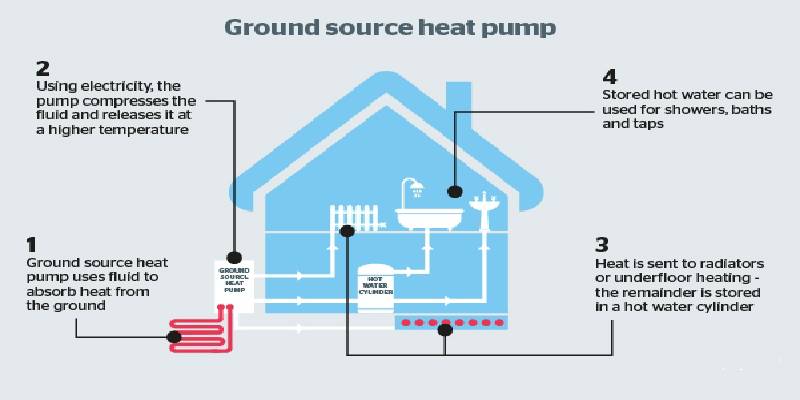Understanding Ground Source Energy Heat Pumps

Adding Smart Pumps To HVAC Systems For Better Efficiency
February 25, 2019
Planning of Pumping Services Is More Than Vital
May 7, 2019Understanding Ground Source Energy Heat Pumps

The planet earth is a massive store of heat energy which can be wielded to either sink heat in during summers or provide warmth during winters. Succinctly said, the ground can act a moderator of temperature for buildings. A ground source heat pump is a device that makes this possible. It can extract heat from the ground and transfer the heat into a building. In a similar manner, it can draw away excess heat from the premises and put it back into the ground when needed.
How do they work?
Ground source heat pumps can be installed anywhere in India as long as a shallow trench or borehole can be made. At times, the pump can also utilise the heat present in the sea, a lake or a pond nearby. A closed loop of heat collecting pipes is installed to extract the stored heat. The tubes contain water mixed with a small amount of anti-freeze.
As the water sucks in the heat from the ground, it warms up the building and provides domestic hot water to the residents. During the summer months, the heat pumps are reversed to give a cooling effect. To increase the efficiency of these heat pumps, solar recharge of the ground is imperative as it makes a vital part of ground source energy.
What else do the ground source heat pumps use?
The pumps utilise electricity to run the compressor and the circulation pumps. Both of which are used to transfer the heat from the ground to the building. This power is only a small component when compared with traditional pumps. Additionally, an accurately designed ground source heat pump can produce 3 to 4 times more heat than an electrical energy pump.
Where can these pumps be installed?
The heat pumps are entirely appropriate for a wide range of buildings. They are the quintessential device for controlling the temperature in projects that want to have a low environmental impact. For those worried about the small component of electricity the pumps consumer, green power can be bought.
Since these pumps operate better with heating systems that are optimised to work at a lower water delivery temperature as compared to traditional radiators, they are ideal for underfloor heating systems.
Advantages of ground source heat pumps
These pumps are the cleanest method of supplying heat to buildings. They do not emit any carbon on site plus they bank on solar energy stored inside the earth to control the temperature of a building. While the initial cost of installing a ground source heat pump is more than a conventional pump, in the long run, the graph stabilises. These pumps not only cost considerably less to maintain but also provide heating which is reliable, safe and emission-free for more than two decades.
For years now, ground source heat pumps have been widely utilised in countries such as Germany, Sweden, and Switzerland. They are now making their way across India with a bang!
Read More : Adding Smart Pumps To HVAC Systems For Better Efficiency

